It’s almost unbelievable to Natalie Medhurst, but at 36 and at the tail end of an elite netball career spanning 17 years, she is pregnant. Emotionally, she’s ‘excited, daunted, and everything in between,’ but most of all, she’s grateful. Facing fertility issues and struggling with the all-encompassing nature of elite sport, she wasn’t sure she’d ever become a mum.
In her earlier years, neither Nat nor her ex-husband wanted kids. On reflection, she said, “I think it was because we realised deep down that we just didn’t want kids with each other. When that relationship finished, my whole perception changed.”
In 2018 Nat met Samuel Butler and, the happiest they’d ever been, the pair quickly realised they wanted a future together. “We’d both been through a lot in terms of previous relationships, so we spent a lot of time talking about who we were as people, our goals and so on.
“The discussion around having a family came up really early, and he was the one who encouraged me to get looked at because I was on oral contraception at that point. So I made an appointment to see a doctor, and things progressed from there.”
Read about Nat’s medical experience below.
Across the next 12 months, Nat went off her oral contraceptives, had various tests and medical procedures, fertility injections, and played the waiting game to see what would happen. It was an unsettling time. She said, “You go through so many emotions when you are trying to get pregnant and you can’t, or it’s not happening.
“To know that the problem was with me was really hard. In sport, I’ve always got my body to do what I needed to do, and perform week in and week out. As females, we are the ones who procreate. While it’s an individual choice as to whether or not we do, it’s our purpose.
“So to think I’d failed in that department, after a career of controlling everything I could about my body, was really hard.
“Together with the issue of my age, the gynaecologist gave me no guarantees that I could become pregnant. That was a lot to digest – I felt as if I was on a rollercoaster.
“I remember being told by the specialist that being too active could work against me. So when she told me not to do too much exercise, I just laughed. It’s part of my job as an elite athlete, so I wasn’t sure how that was going to work.”

Nat Medhurst playing for the Australian Diamonds. Image Simon Leonard
Nat’s first cycle of fertility injections failed, and she remembers all too well the misery of its ending. It was the day of the AFL grand final, and as a former West Coast Eagle premiership player, Samuel was attending a function. Nat was at a girlfriend’s house when her period arrived.
“I was an absolute mess. I sent him a message saying it hadn’t worked, and next thing I know he was at home, ringing me to find out where I was. I hadn’t asked him to come, but for him to leave such a special function to be with me was pretty amazing.”
Almost unbelievably to Nat, the second cycle was a success. She was training at Collingwood when she received the news, and immediately let the club doctor and head of high performance know. Telling Samuel had to wait for four days until he returned from London.
“I’d developed a small cyst or some fluid that was picked up on the ultrasound, so if I wasn’t pregnant I was going to need surgery to see what it was, in case it was stopping me from becoming pregnant. I didn’t want to tell Samuel if I needed surgery on the phone, because then he’d know if I was pregnant.”
Collingwood told Nat to take some time off training so that she could enjoy telling Samuel her news. “I remember picking him up from the airport, and I hadn’t seen him for ten days. I was highly hormonal and very emotional, I was in tears when I saw him. But I waited till we got home to tell him.”
The first 14 weeks of Nat’s pregnancy were rough. She was exhausted, nauseous all day and often vomiting while trying to combine it with the rigours of pre-season training. She was also concerned about a tournament in New Zealand, where she would be expected to play five games in six days.
The Collingwood coach, Rob Wright, called Nat into a meeting. “He said that I didn’t look right. We’d previously spoken about managing my load, and he asked if I wanted to have a break from netball. When he asked how I was feeling, I said, ‘I’m feeling pregnant!’ His jaw just dropped.”
“I felt sorry for Rob, because I was the third Collingwood player who’d done it to him, but he was phenomenal, just so excited for us.
“I was also relieved that I’d told him, because he needed time to get his head around what it meant for the team.”

Nat Medhurst is appreciative of the support from Collingwood. Image: Aliesha Vicars
Nat feels incredibly fortunate that Collingwood offered her so much moral and practical support, but is also worried that it might not be the experience at every other club.
“The club, and Rob in particular, get that there is more to life than sport, and they are very family oriented. They’ve been so excited and ridden everything with me. It’s made my pregnancy so much more enjoyable, at what is a fairly emotional time.
“But clubs are in the business of winning games, and I know when maternity provisions were put in the latest Players’ Agreement, that there was very real concern from the member organisations that more players would become pregnant and have a paid holiday.
“But it’s not that easy to fall pregnant, and given that there’s no assurances or support for players to come back if they’re out of contract, those concerns are skewed.
“Players have just as much right to have a family and receive maternity provisions as anyone, so sadly it highlights that clubs are more concerned about performance and less about the health and welfare of their athletes.”
As Nat would be too pregnant to play 2020 Suncorp Super Netball, she and the club decided there would be no point in ‘flogging’ her during the rest of the pre-season. The club kept her involved in the program as best they could, but after so long at the top she found it difficult to sit on the sidelines. Nat said, “I really struggled with that.”
“I’d always been part of a team, you train, you play, you work towards something. So I suddenly felt obsolete. I was in the team, but not in the team, I was a player, but not a player. I didn’t know where to go or who to talk to. While the club was great, and it wasn’t anyone’s fault, it was just the reality of being part of a sporting environment.”

Nat Medhurst represented the Queensland Firebirds from 2010 – 2013. Photo: Simon Leonard
Nat still isn’t sure if she’ll return to elite netball. She’d always assumed that 2020 would be her last season, but she now has a sense of unfinished business. “As an athlete there’s no transition phase between having a working career, and having a family. There’s no middle ground.
“It would be awesome if I could come back and play, and the coaches have given some thought to it. But I’m going through something I’ve never done before. I’ve no idea what it will be like physically, what kind of birth I will have. Even if everything goes well, I may not want to, because becoming a mum might change all of my priorities.
“I do know that I’d never do anything that would put the baby or myself at risk of coming back, because I’ve got nothing to prove. But on the flip side, I might want to play on.”
During the 12 month period in which Nat’s had her fertility examined and gone on to become pregnant, Samuel has been with her every step of the way. Nat said, “I have taken so much strength and positivity from going through this process together. It’s been incredibly challenging and emotional at times, but he’s given me so much support.
“He’s given me my injections because he wanted to be part of the process. He’s been very hands-on and can’t wait to be a father. I think he’s going to be amazing at that.”
While Nat’s had the outcome she wanted, she feels that the topic of fertility is shrouded in secrecy for elite athletes. That there isn’t enough information readily available. That players feel guilty because they are trying to balance a sporting career with becoming mums. That some club staff may lack understanding.
“There’s no education on what the impact of waiting to have a family can have, or if you do want to wait, what are your options. What decisions can you control when it comes to your body, your fertility and your desire to have a family down the track.
“Very few women can have a baby at a perfect time in their playing career, and then come back without any detriment. While some players like (Laura) Geitzy, and Bec Bulley and Renae Ingles manage it and are sensational, it’s sad that there’s not more.
“There needs to be greater support given so that athletes don’t feel they have to sacrifice one dream for another.”

Nat Medhurst and Sam Butler announcing their pregnancy. Image courtesy of Nat Medhurst
Nat’s medical experience
The first step was to stop taking oral contraception.
I’d been off it for a while, and nothing was happening. So when I moved to Melbourne I went to see a specialist, and started by having some blood tests. Collingwood was at a pre-season tournament in Hobart (in 2019) and because of the timing I had to get a blood test while I was there to see what was happening with my ovulation and egg numbers. It came back that I wasn’t ovulating.
Samuel and I then sat down with the obstetrician, putting in the factors of age, what that meant, what it looked like, and working out a plan.
We’d flagged at the time that there was some medication that I could use to help me ovulate. But it was banned by the World Anti-Doping Authority, which a lot of female athletes wouldn’t realise. I only knew that because I remember Simone Forbes was missing from the 2011 Netball World Championships, because her doctor didn’t know. I told my obstetrician, he did some research and found that it was. I wouldn’t have known otherwise, so it was pure luck that I remembered that story.
We spoke about trying to get a TUE (Therapeutic Use Exemption), but the specialist said that even if we went down that path, if I had any blockages of my tubes, or endometriosis, that the medication wouldn’t work anyway. He needed to go in and have a look.
I wanted to get on the front foot straight away, and the club agreed that I could have surgery a week before the 2019 pre-season tournament in Brisbane. The specialist had a look through my insides, found that I had a blocked fallopian tube, and cleaned a few things up.
I probably shouldn’t have played six days after the surgery, and I know the specialist thought I was an idiot. But I didn’t feel comfortable taking that time off because I had a sense of guilt that I was looking after my own health and I didn’t have 100% of my attention on netball. The club was great, but it’s just that we don’t discuss these topics at that level.
From then it was a waiting game. I went through so many emotions, and that is true for any woman who is trying to get pregnant.
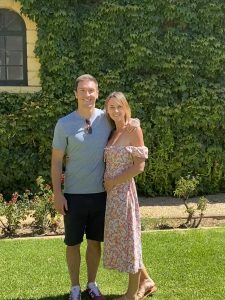
Nat Medhurst and her partner Sam Butler. Image courtesy of Nat Medhurst
My obstetrician then referred me to a fertility specialist, and we had another thorough conversation about what treatment might look like and medication that was safe for me to use. It was so reassuring to have a plan in place.
I was put onto Gonal-F injections, which is a naturally occurring hormone used to stimulate a follicle to develop and mature. I was going to have to inject myself daily into the abdomen, in a process similar to IVF. The specialist didn’t know how my body would respond, so we started on the lowest possible dose.
Samuel was doing the injections for me when he could, but it was during the playing season so I would travel with my medication and inject myself in hotel rooms in private. I don’t even like taking Panadol, so it was amazing to have Samuel so involved and seeing what I was doing to my body.
After a week of injections I went back for an internal ultrasound, so the clinic could look at the size of the follicles and how they were developing. We were trying to force a follicle to perform so that I would then ovulate.
The first round took quite a while, and then we started increasing the dosage until the point where things started to respond. I was going for internal ultrasounds about every week until the follicle reached 10 ml in size, then I had to go in every three to four days after that, because the follicle can grow almost 2 ml per day.
They had to check so regularly so that my ovaries weren’t overstimulated and to make sure I’d only produced one egg. Once the follicle was big enough I gave myself a big injection known as a trigger shot. This made the follicle drop so that I ovulated.
Then I was given a piece of paper that mapped out our sex life. It told us to have sex on this day and this day, and that we could also have sex on this day. Then it’s almost a three week wait from the time of the trigger shot to the pregnancy test.
The specialist wasn’t going to give us too many chances for this to work, because my age was against me.
On the second cycle, my body felt so different after the trigger shot. I was exhausted – having dinner at 4.30 pm and going straight to bed, and that was fairly shortly after a three hour nap. I had sore boobs, I was really hot, and that’s pretty rare because I have Reynaud’s disease.
I did take a pregnancy test shortly before the blood test, but then I remembered that the medication I was injected with is what a body makes if you’re pregnant. So while the injections can give the same symptoms as pregnancy, it turned out that I was.
We were all pretty shocked that it happened so quickly, and it’s been pretty smooth sailing. It’s been incredibly challenging and emotional at times, but I take a lot of strength from having gone through the process.
I think sport is naïve if it thinks that fertility isn’t a serious issue for athletes. If they spoke to past players or some of the senior players, they would realise this, and hopefully take steps to make sure that younger players are better educated. I do have conversations with the younger players, telling them to keep on top of it.
Fertility needs to be an ongoing conversation, not a taboo subject.

Nat Medhurst pregnant and blooming. Image courtesy of Nat Medhurst
Acknowledgements
With thanks to Associate Professor Vinay Rane, Associate Professor Clare Minahan, Dr Susan White, Liz Ellis, Kath Harby-Williams, and particularly Geva Mentor, Natalie Medhurst and Sonia Mkoloma. In sharing their personal stories, these wonderful women are our greatest advocates for change.
This is Part Four of the serialisation of Netball Scoop’s investigation into fertility issues among female athletes. To read the rest of the series, follow these links:
How can female athletes be better supported

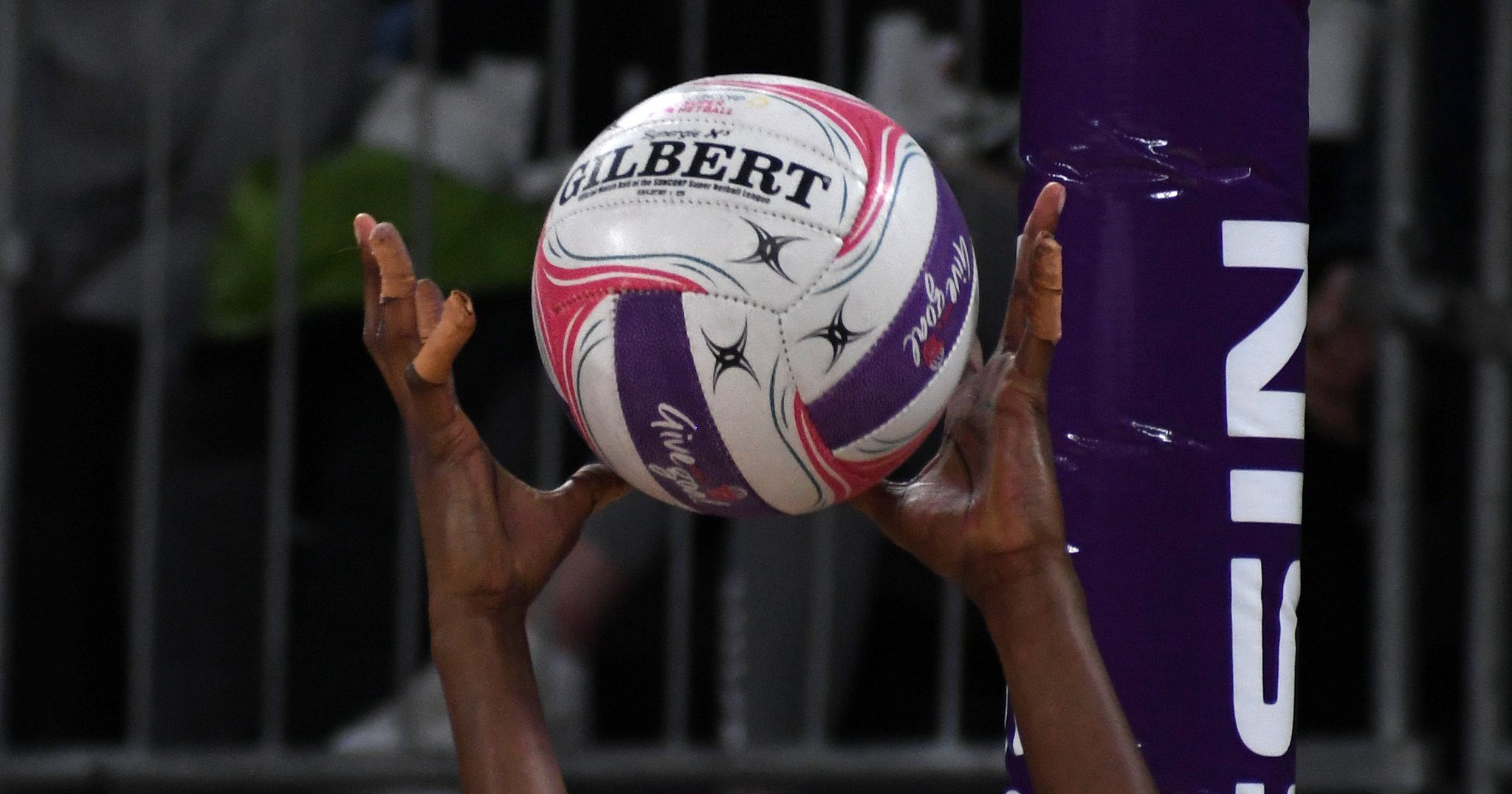


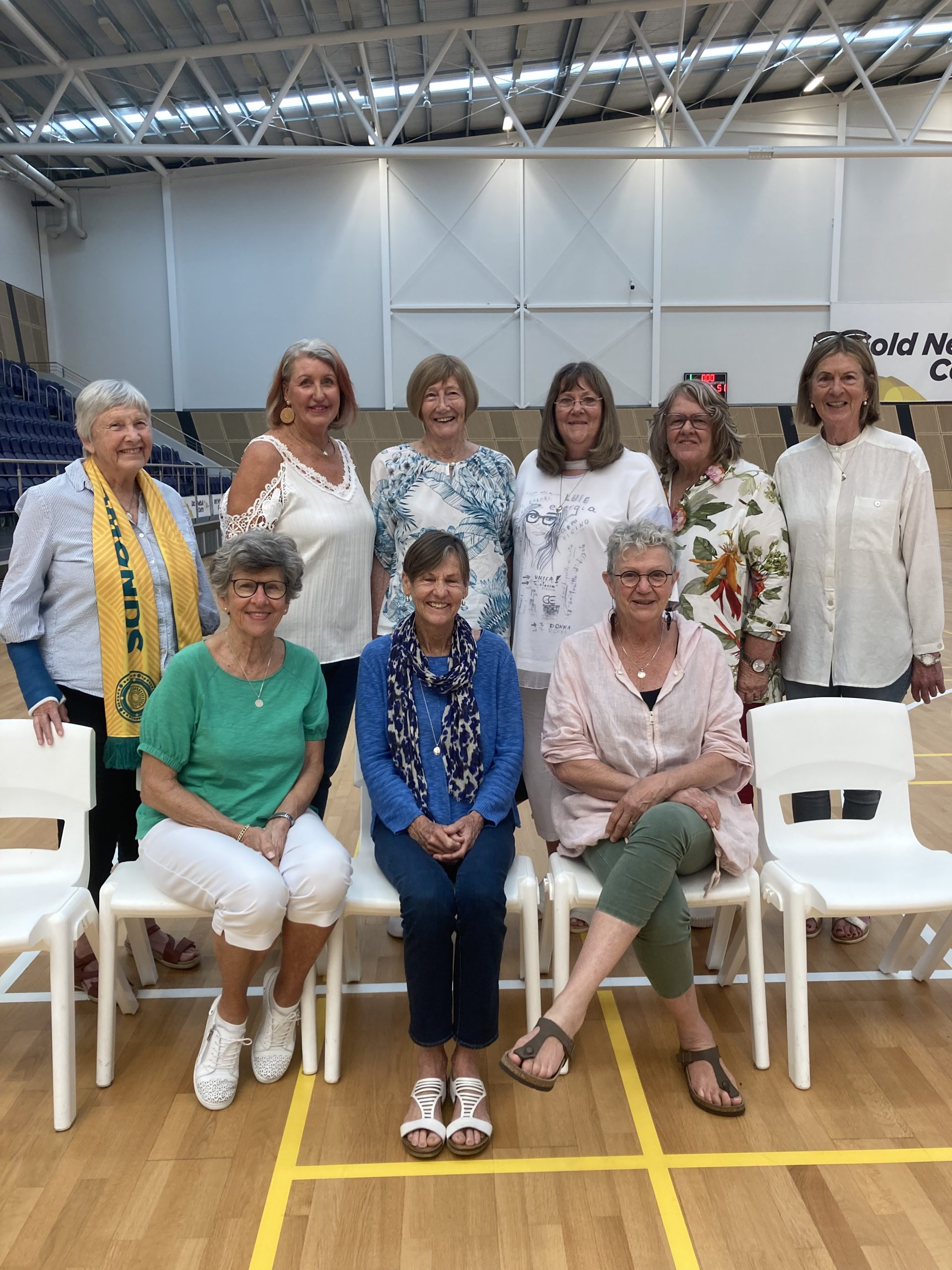
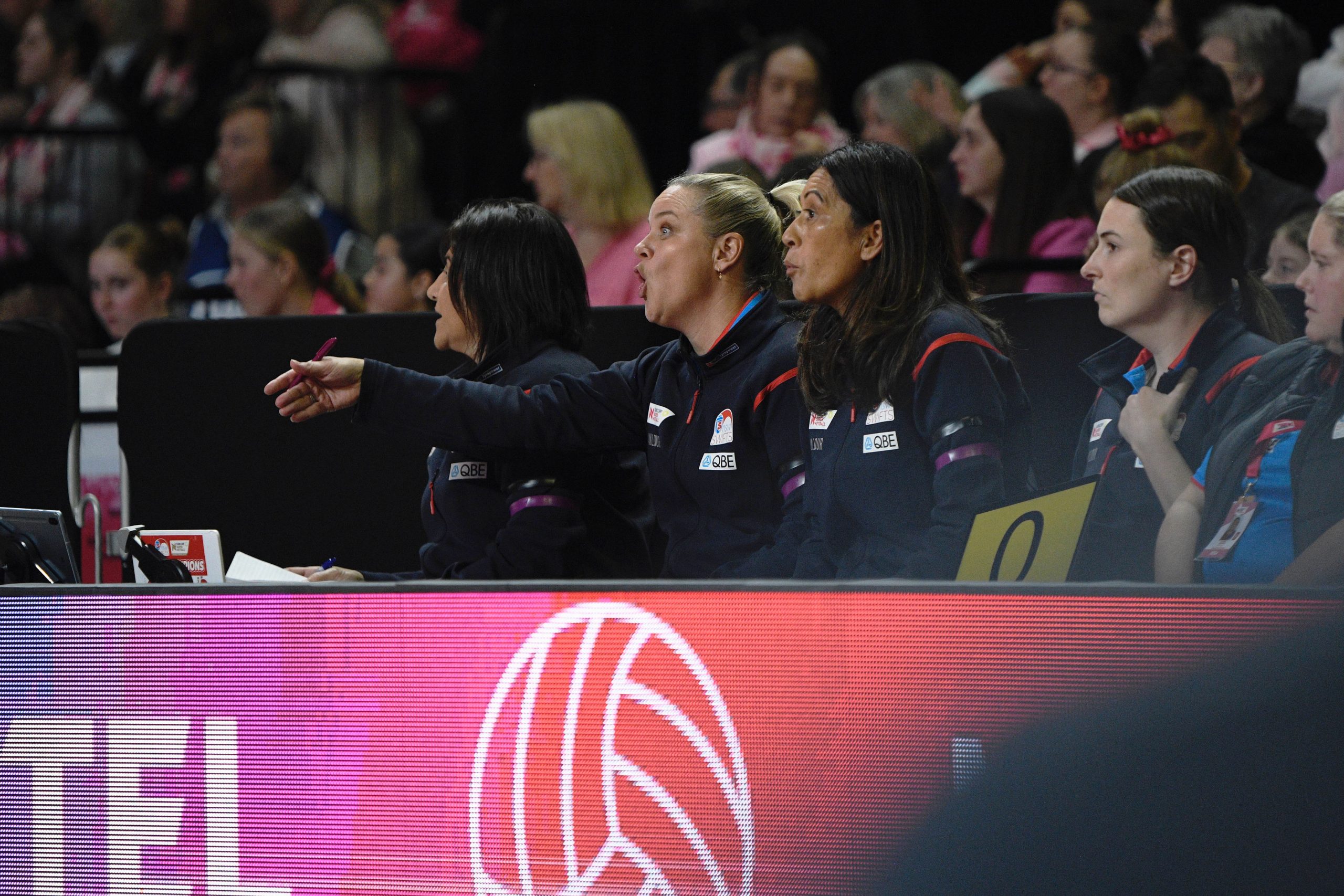
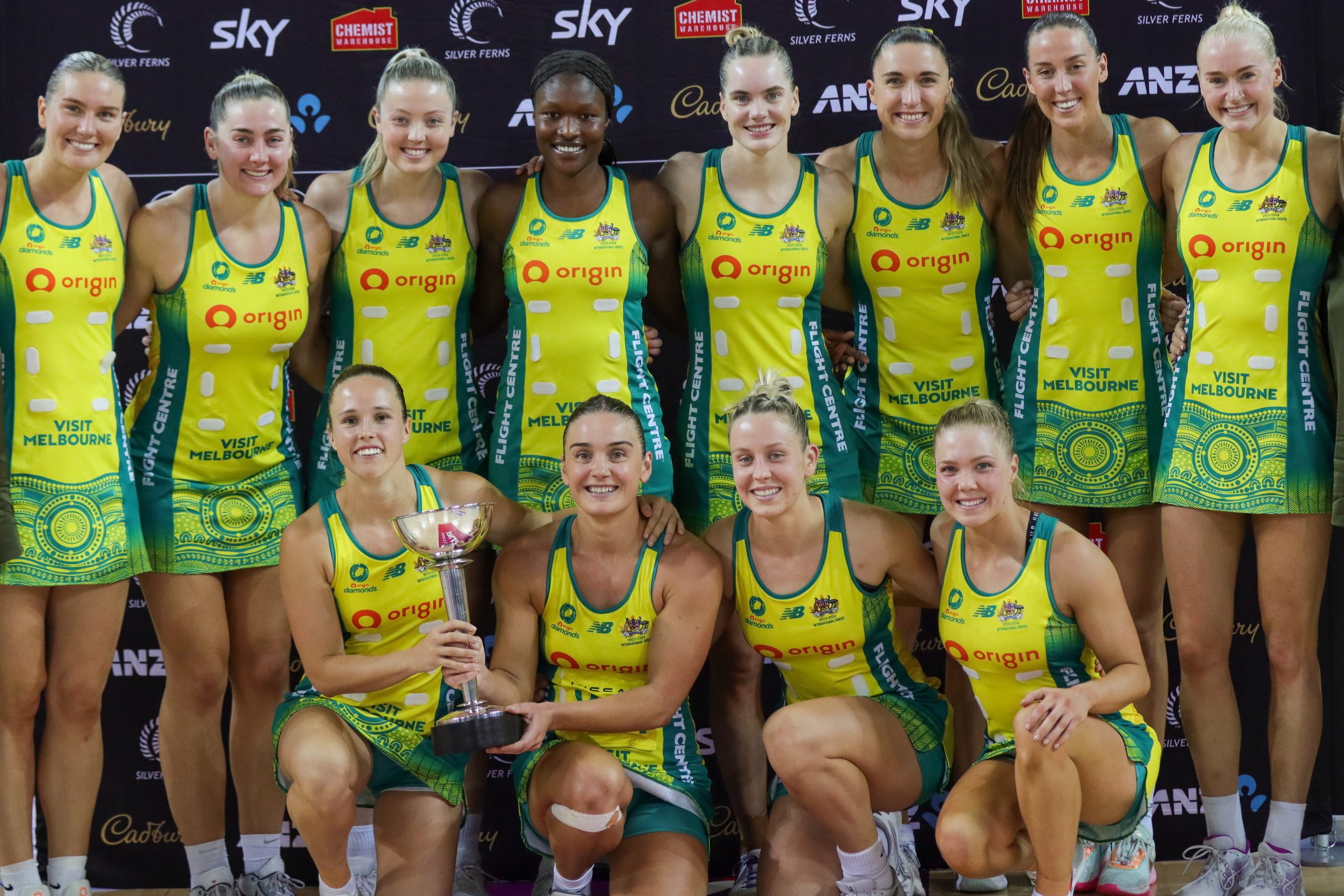


[…] Natalie Medhurst – pregnancy after fertility treatment […]
[…] Natalie Medhurst – pregnancy after fertility treatment […]
[…] Natalie Medhurst – pregnancy after fertility treatment […]